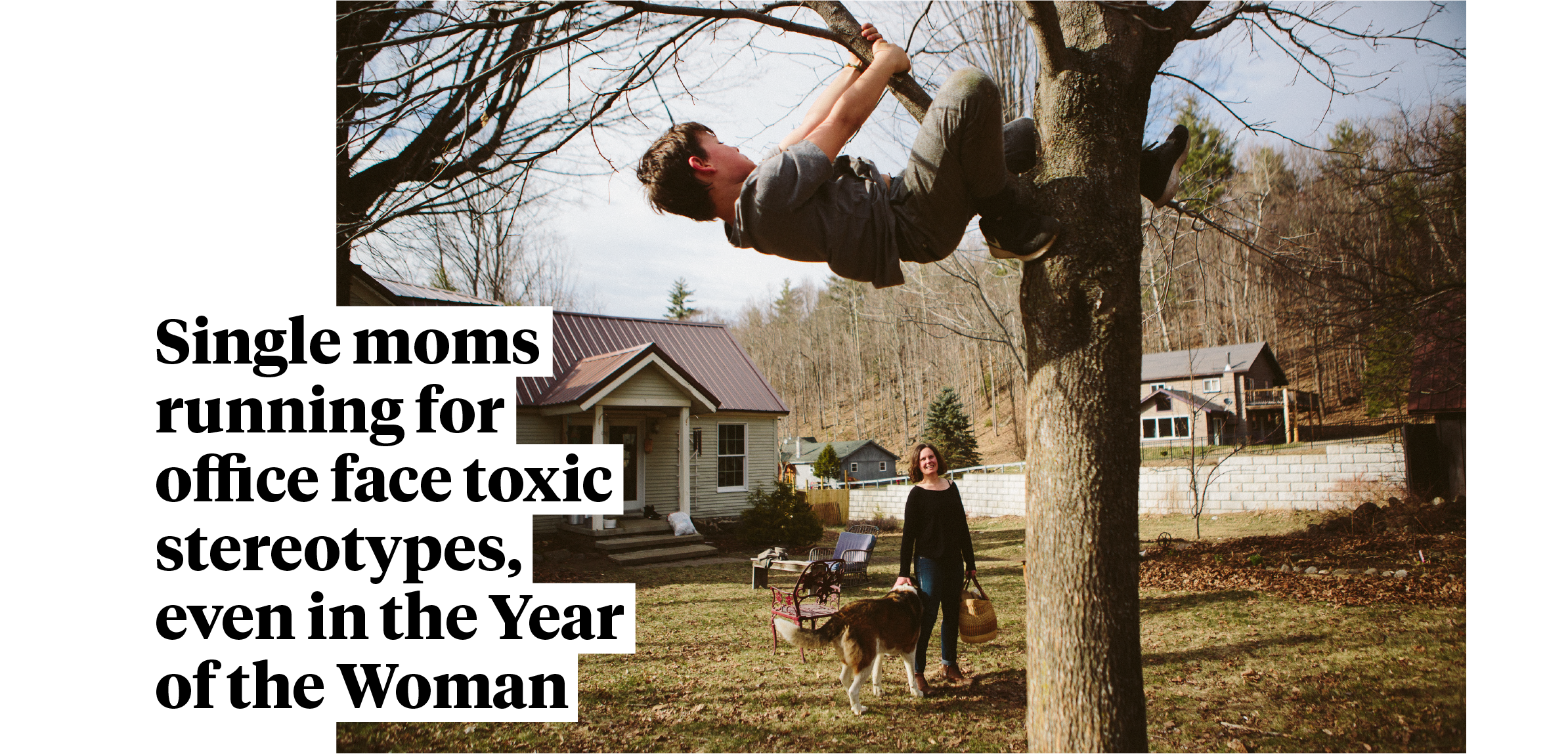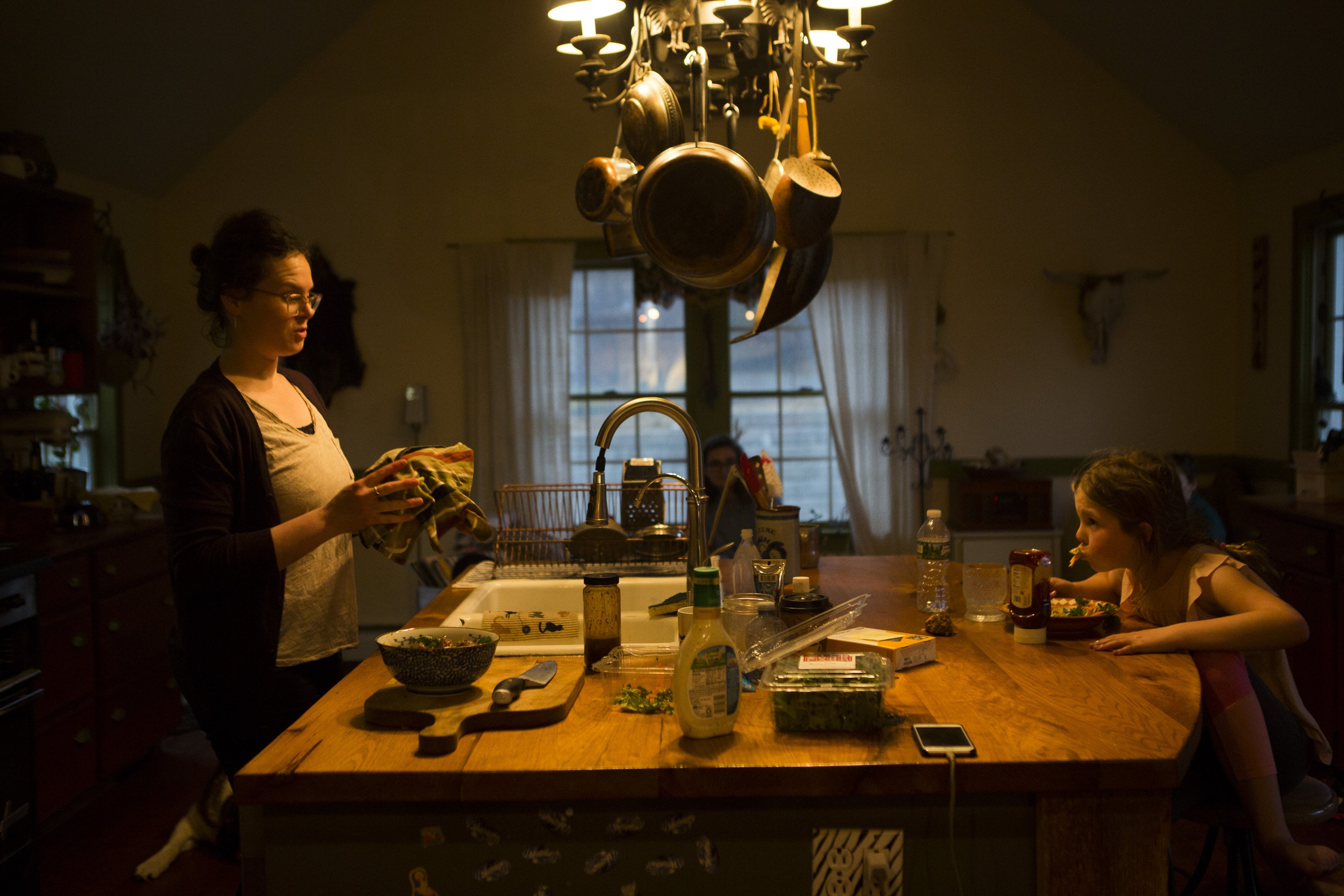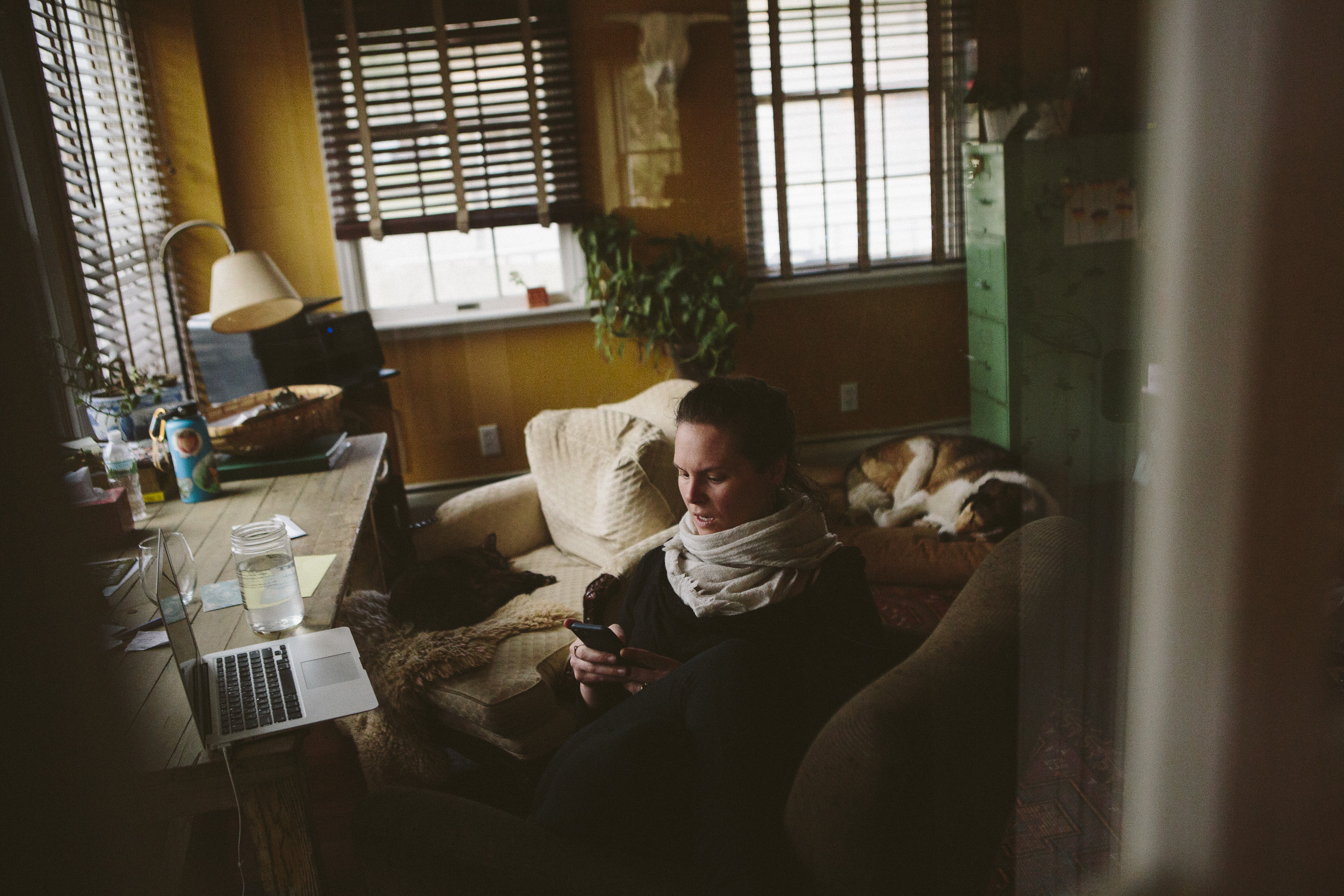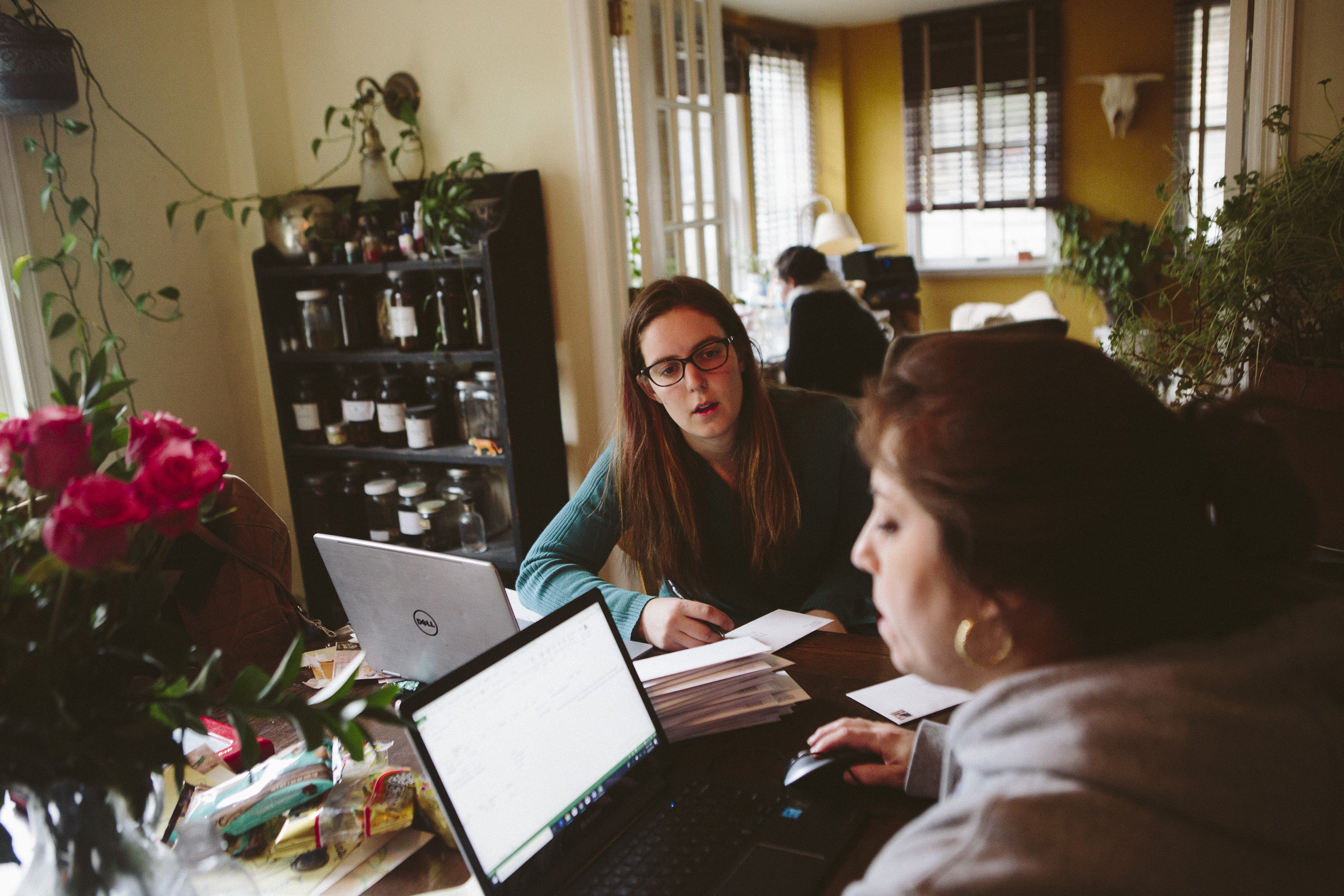
KEENE, New York — “Who’s taking care of your kids tonight?”
It’s a question male politicians never hear, but Katie Wilson, who’s running to represent New York’s 21st District in the U.S. House, has been asked it more than once. At candidate meet-and-greets. On social media. Grabbing a drink after a campaign event.
People keep asking this question not only because she’s a woman campaigning full-time while raising two young kids but also because she’s a single mom. By definition, she doesn’t have a spouse at home to help with child care. Wilson knows the assumption: Her candidacy means she’s neglecting her children, or being selfish, or hopelessly trying to “have it all.”
“The tendency is to immediately question myself and what I’m doing and feel some shame or guilt,” Wilson said. “But then I check myself.”
The 34-year-old native of upstate New York has a halo of curly brown hair and the straightforward, calming demeanor of a yoga instructor, right down to the sporty, earth-toned clothes she favors. She has a gift for making strangers feel at home, which is lucky for her campaign, since its headquarters is her dining room table.

Wilson was terrified for her children — Zinnia, 8, and Cooper, 10 — after Donald Trump won the 2016 election. And so, though she lacks any experience holding elected office, she decided to step away from her consignment shop and run for the 21st, a largely rural district that comprises almost the entire northern half of New York state.
“I can stay here and continue doing what I’m doing, feeling unfulfilled, angry, frustrated, worried about my kids’ future, or I can actively participate in creating it,” Wilson explained. She added, “I actually feel like I’ve been — if I was judging my parenting — a better parent, more present and measured, since doing this.”
Single moms are an enormous and underrepresented demographic: Nearly 9.5 million unmarried women are raising children under 18 in this country, yet only a handful of single moms have ever served in Congress. In the course of reporting this story, I talked to nine single moms running for local, state, and federal offices across eight states. (Two raised kids on their own but have since remarried.) Compare that to the 2,238 women who have filed to run for federal, statewide, and state legislative offices around the country this year.
So single moms remain rare among politicians. But in this second “Year of the Woman,” it’s possible that more women like Katie Wilson could wind up on the ballot — if they can manage to surmount the same long-held sexist and racist stereotypes about single motherhood that make voters so curious about Wilson’s parenting.

Moms running for office is nothing new. In fact, politicians often use motherhood as a selling point. Washington Democrat Patty Murray earned a victory in her Senate race in 1992 — the first “Year of the Woman” — by casting herself as just “a mom in tennis shoes.” (In an article on Murray’s primary victory, the New York Times called it “perhaps the most powerful variation yet in sexual politics.”) And the tactic isn’t limited to one side of the aisle: During the 2008 presidential election, Sarah Palin called herself a “hockey mom” and a “mama grizzly.”

But this year, women are being even more up-front about toggling between family and politics. At least two women running in gubernatorial races aired campaign ads that showed them breastfeeding. After helping to engineer a rule change to allow infants on the Senate floor, Illinois Sen. Tammy Duckworth showed up to work with her 10-day-old daughter.
Jill Greenlee, an associate professor of politics at Brandeis University who wrote the book “The Political Consequences of Motherhood,” isn’t sure if candidates are leading the charge on transforming our perceptions of moms in politics, or if voters are just thirsting for a change. “Are voters thinking about women differently?” she asked. “Or are we just being presented with a different conversation?”
It’s likely a mix of both. Four in 10 voters believe female politicians are “different” from the overwhelmingly male, overwhelmingly white elected officials who dominate American politics, a nationwide survey from the Barbara Lee Family Foundation found. Both Democratic and Republican women thus have a “distinctive advantage” among voters this election cycle, the foundation discovered, since so many are fed up with the status quo.
That doesn’t prove, however, that the 2018 elections will magically erase decades of sexism. Americans tend to prefer male and female candidates who have children, Greenlee said, but they also have reservations about women’s ability to parent while politicking.
“Women end up being in this bind because the expectation is that they have kids, but they also have to be clear that they’re being a good mother. Men don’t have that same expectation,” Greenlee explained. “Motherhood is like this challenge that female candidates have to overcome.”

That challenge can be even more acute for single mothers. The prejudice against them, along with the enormous effort required to run any political campaign, can discourage them from seeking office.
As a group, single moms are, historically, not well-liked. In a 2015 Pew Research Center study, two-thirds of adults said that an increase in the number of single women raising children would be bad for society. (That survey did not ask about single fatherhood.)
Sarah Coats, a single mom who’s running for a seat in the Kansas state House, said people sometimes ask her if she’ll be able to handle being a lawmaker on top of her other responsibilities. Single motherhood is one of the largest risk factors for poverty in the United States, and almost a third of households run by single women have incomes below the poverty line.
“I do have a mortgage and I do have student loans, and so I do have to maintain a job,” said Coats, a full-time social worker. She pointed out, “We don’t ask men that. We don’t ask men that are single fathers if they can manage it.”

Politicians have attacked single moms for years, scapegoating them in tirades against the American welfare state, crime rates, and loose morals. Ronald Reagan famously trotted out the trope of the “welfare queen” who collected benefits for “four nonexistent deceased veteran husbands.” (Translation: She’s single!) Almost 20 years later, in 1994, former Sen. Rick Santorum told a campaign town hall, “We are seeing the fabric of this country fall apart, and it’s falling apart because of single moms.” He won that election, and remained in office until 2007.

While there’s very little research on voters’ views of single moms who double as politicians, the evidence we do have suggests their opinions are rooted in the same stereotypes. In 2016, the Barbara Lee Family Foundation handed voters newspaper articles about four candidates running for governor: Tom Pavey, a married father with two young daughters; Amy Jones, a married mom with a young son; Danielle Smith, a single woman with no children; and Kristen Burr, a single mom with two young daughters. None of the candidates was real; rather, researchers hoped to gauge just how much a candidate’s family life affected voters’ impression of their effectiveness.
Burr, it turned out, provoked the most uncertainty among voters. Thirty-five percent said “concerns about her family” raised serious doubts about her candidacy. Twelve percent labeled their doubts “very serious.”
“Families look so different now than they did in the 1960s, and while people acknowledge that families look different, they seem to still have traditional beliefs about who should be doing the majority of responsibilities in the home,” said Amanda Hunter, the foundation’s communications director. “The funny thing is, in this research, voters actually admitted to and at times questioned the double standards that mothers face on the campaign trail. But they still actively participated in it.”
Those double standards are likely racist as well as sexist. “It’s really important to note that we have not adequately explored what all this means for women of color,” Greenlee said. “A single, white woman running for office probably will be perceived differently than a single, African-American woman with children running for office. People are going to make different assumptions about what the story is behind that experience.”

Ironically, Wilson said she sometimes gets attacked for not being “single mom enough,” since Zinnia and Cooper’s father still lives in Keene (population: 1,105) and swaps parenting duties with her every other week. Wilson recalled women telling her, “You’re not really a single mom. They have a dad.”
“When they’re with me, though, it’s all me. I am responsible,” Wilson told me. When I spent three days with her in Keene in April, she took her kids on playdates and walks through the woods, attended parent-teacher conferences, and made homemade burgers for dinner — while squeezing in time to make calls for donations and hold strategy sessions with her team.
The comments haven’t stopped Wilson from leaning into her “single mom” label throughout her campaign. She proudly discussed parenting solo in essays for outlets like Refinery29 (“We Need More Single Mothers Like Me in Congress — Here's Why”) and Lenny Letter (“I’m a Single Mom, and I’m Running for Congress”).
“The point of those articles — which isn’t the headline, because it’s not as headline-y or sexy — is I’m just a working-class person,” Wilson said. “I’m someone who is just kind of getting by, day-to-day, like most people in the country. That is what’s required to be part of the conversation, if we’re going to move the needle on a lot of issues.”

Vote Run Lead, an organization that trains women to run for office, is focusing many of its workshops this election cycle around a similarly unapologetic theme, which it’s dubbed “Run As You Are.” The idea, CEO and founder Erin Vilardi explained, is to convince women like Wilson that their time spent learning how to wrangle a complex schedule and provide for their kids has already given them the experience they need to seek political office.
“We’re teaching women that there’s nothing to hide about being a single mom who wants to run for office,” Vilardi said. “Of course you’re gonna show your kids. Of course you’re going to show you’re a single mom.”
“There’s nothing to hide about being a single mom who wants to run for office.”
Mary Catherine Roberson, a single mom of three girls and a Democrat who won her March primary for Vermilion County Clerk in Illinois, decided to run after attending a Vote Run Lead training. She already worked two jobs, as she has her entire adult life, training people to become U.S. citizens at her local community college and coordinating after-school programs at a nearby middle school. Sometimes she doesn’t get home till 9 at night; her two older daughters, who are 9 and 10, will often get up early before school so that they can all hang out.
Initially, Roberson doubted herself: She wasn’t rich. She didn’t want to miss out on spending time with her girls. She’d never run for office before. Was she really qualified?

That feeling is common among women. They’re historically unlikely to run for office unless they’re recruited to do so, but they’re also less likely than men to be recruited, according to Jennifer Lawless, who heads the Women & Politics Institute at American University. Even women who are traditionally thought of as “well-positioned” to run for office — meaning, they’re educated, interested in politics, and have embarked in careers in tony fields like business or law — are about 40 percent less likely than their male peers to consider doing so, Lawless found in a 2014 study. Lawless calls that gulf “the ambition gap.” For single moms, the gap might be even wider.
Then Roberson remembered, Oh yeah, Donald Trump is president.
Although most of the women campaigning for office this year identify as Democrats, it was, ironically, Trump’s victory that led many to realize they could run even if they don’t fit the traditional political mold. “Everybody looked at Trump and said, ‘This man has zero political experience, zero military experience,’ and said, ‘He’s the president? I can definitely run for my city council,’” Vilardi said. “‘No more am I disqualifying myself.’”
“It’s made me comfortable with being a ‘flawed’ candidate,” explained Roberson. “Instead of ‘single mother’ being a deficiency, now if someone tried to attack me on that, I could flip that on [its] head.” She slipped into her candidate voice — incredulous, confident. “‘The fact that I have two baby daddies? Is that what we’re talking about right now?’”

“Being in Congress is just a job, if you don’t let it go to your head.”
Deborah Pryce, who adopted her daughter Mia in 2002 while working as a congresswoman in Ohio, never thought all that much about being a single mother, even though she’s one of the few to have served in Congress. “Raising a child is difficult. It takes a lot of time and concentration,” she said. “But there are many, many working mothers in this country. And being in Congress is just a job, if you don’t let it go to your head and you do it right.”
Still, it doesn’t come without compromises. Pryce knew when she adopted Mia that she’d retire from Congress one day soon, she told me. Mia had a frequent babysitter during Pryce’s time in Washington, and Pryce wanted to spend more time with her. She made good on that promise in 2008, and today works as a lawyer.
Mia is now 16. “She still does pay attention to the news and government, and so I’m glad that she had that beginning,” Pryce said. “She’ll always have that little bit of it in her.”
All the single moms or former single moms running for office that I talked to — whether they were running for the state legislature in Pennsylvania, like Melissa Shusterman, for school board in Florida, like La Shonda Davison, or for the governor’s mansion in New Hampshire, like Molly Kelly — saw their foray into politics as a message to their own children: Work hard. You don’t have to be perfect. You can change the world. Women can change the world.

Lori Lennon, who’s running for Massachusetts’ state legislature, called her 8-year-old daughter “my second campaign manager.” Nebraska state legislature candidate Megan Hunt said her own 8-year-old, Alice, canvases with her and helps sort spreadsheets. “The campaign to her, I think, it just feels like another thing that mom does,” Hunt said. “I think the best example I set for her is of a woman who’s following her own path, even if it’s not an easy path. I try to be the woman for her that I needed when I was her age.”
“I try to be the woman for her that I needed when I was her age.”
Several weeks ago, Wilson took Zinnia and Cooper on a several-hour road trip to a luncheon with her primary opponents. Wilson will face off against four other Democrats on June 26, including longtime CNBC and MSNBC anchor Dylan Ratigan. If she succeeds, Wilson must defeat Elise Stefanik, the Republican who currently represents the district sometimes known as “the North Country.”
Wilson sat at a panel at the front of the room. By the end of the panel, Zinnia had crawled into her lap, but Cooper stayed put and sat with the adults. At one point, he raised his hand and asked a question: “Is it hard to run for Congress, and if so, why?”
Each candidate answered, Wilson said. “We all appreciated the question, bring it back to reality a little bit and our experience. That’s a more personal question than anyone’s ever asked, at any of these damn forums.”
Then, after they drove home, Cooper told his mom something he’d never told her before.
“He was like, ‘Mom, I just want you to know, I’m so proud of you. I want to be just like you when I grow up,’” Wilson said. As she recalled the moment, sitting on her kitchen counter, Wilson put her face in her hands and laughed at herself. “I was like, in tears. I was trying to be cool.”
Carter Sherman is a reporter for VICE News.

